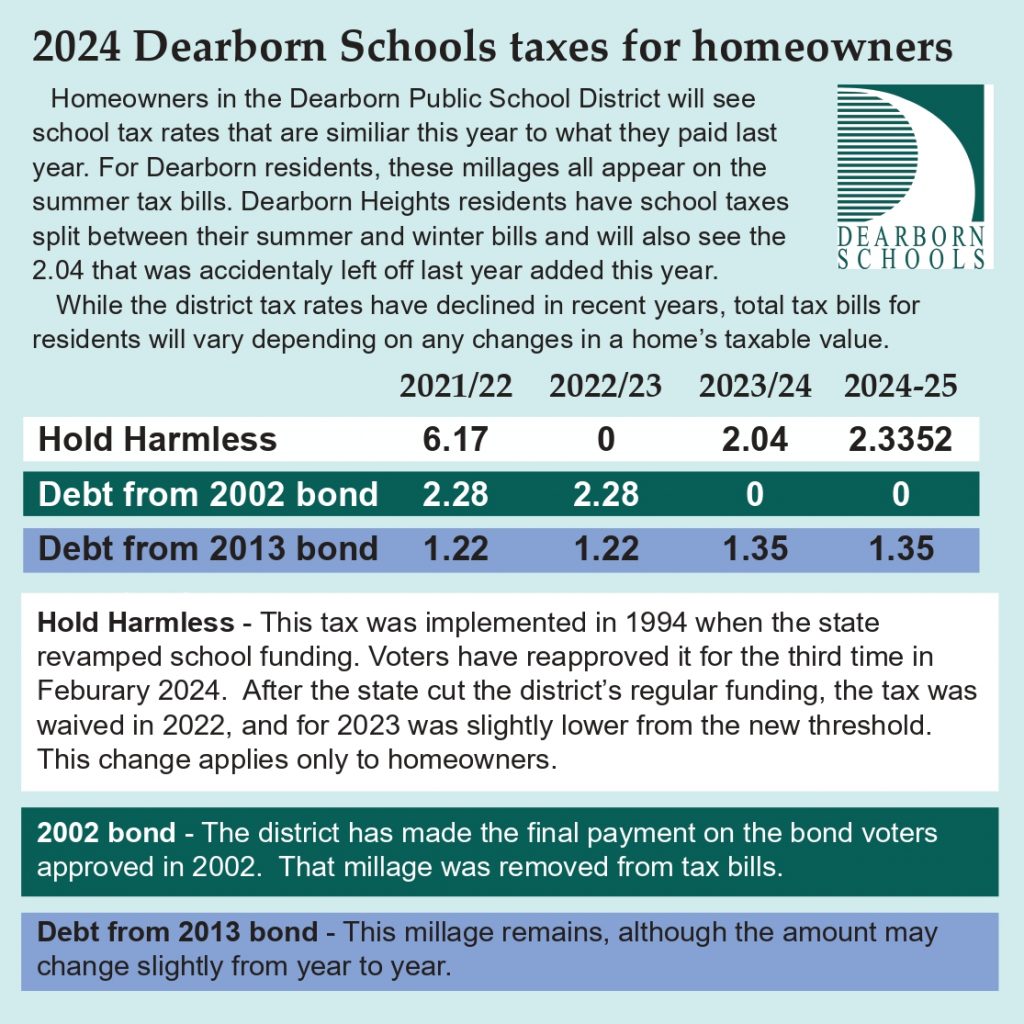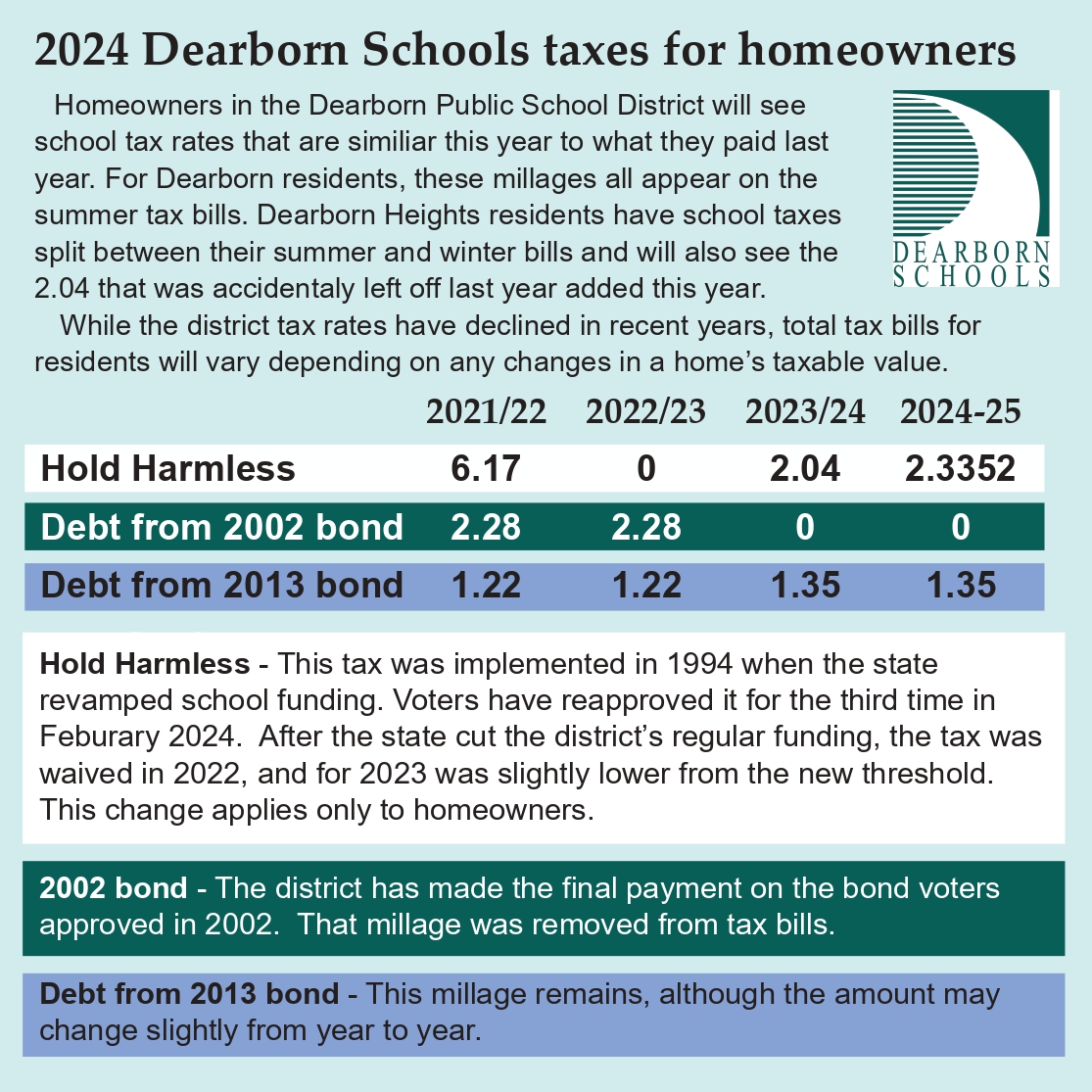While Dearborn Public Schools is only collecting 2.3352 mills of its recently reapproved operating millage, some property owners in Dearborn and Dearborn Heights will see higher rates this summer after it was discovered that the tax was left off some bills last year.
For the 2024-25 tax cycle, the district’s operating millage will be 2.3352 mills, well below the 4 mills that was authorized by voters in February. That operating millage will apply to district property owners in both municipalities. Dearborn Public Schools includes almost all of Dearborn and a section of Dearborn Heights. Property owners will also see 1.35 mills for payments for the school bond voters approved in 2013. For comparison, total school district taxes for homeowners this year are 3.6852 mills, which is far lower than the 9.67 mills homeowners paid as recently as 2021. (See the tax chart.)
This is the last year Dearborn Public Schools is authorized by voters to collect up to 6.17 mills under an operating millage reapproved in 2014. After 2024, the district can only collect up to a maximum of 4 mills, which voters approved in February 2024. The district expects the operating millage rate to settle in the range of 2.4 mills, but it will vary some each year. Dearborn Schools is allowed to collect $313 per student, so the millage is based on enrollment times the per pupil amount and then divided by taxable values. A mill is $1 of tax for every $1,000 of taxable value.
Two years ago, Dearborn Public Schools did not levy its operating millage to correct for an issue caused by the late passage of the state budget the previous year. That state budget required the district to lower the amount it collected from property owners, but the change came after most property tax bills had been paid.
For last year’s 2023-24 tax cycle, the district levied 2.04 mills. The rate was still slightly lower than usual to finish making up for the overcollection two years prior.
However, the district recently learned that due to clerical errors, the cities under collected district taxes on last year’s bills. The City of Dearborn failed to collect the reinstated 2.04 operating millage on the district’s non-homestead properties, including businesses and rentals, in the summer of 2023. Dearborn Heights did not collect the operating millage in the 2023-24 tax cycle on district homeowners in that city. Because of the omissions, the property owners who were under taxed last year will have the additional 2.04 mill tax added to this year’s tax bills as a one time correction.
Last of ESSER funding
The Board of Education approved the tentative 2024-25 budget at its June 3, 2024 meeting. The budget is the district’s best estimate since about 70 percent of school funding comes from the state, and legislators and the governor have not yet approved school funding for next year.
The $452 million initial district budget includes the last wave of COVID-related funding. Funds from the Elementary and Secondary School Emergency Relief Act (ESSER) must be spent, or at least allocated, by Sept. 30, 2024. The Michigan Department of Education’s COVID spending dashboard shows the district has already spent most of the $137 million it received through ESSER and related programs. The remaining 15 percent, or $20 million, is slated for ongoing building projects, including the expansion at Haigh Elementary and the installation of air conditioning at Howard, Long and Nowlin elementary schools. Those projects are scheduled to wrap up before school resumes in August. ESSER funds can only be used for specific budget items. Among those items are building projects to improve air-handling in schools.
Unlike some districts across the state and country, Dearborn Public Schools does not expect any drastic operating changes from the funding cliff created by the end of COVID relief funds. The district budget calls for a slight reduction in staffing, but no layoffs are expected. Staff reductions are also needed due an enrollment decline of about 1,000 students since the fall of 2019. Wages make up $165 million of the district budget for next year.
However, with the end of ESSER, the district will be forced to reduce what it has been spending on building repairs and maintenance as certain staff salaries and other items funded by ESSER move back onto the regular budget. The district allocated $6 million the 2023-24 school year from its regular budget to building work.
Electric buses coming
In other project news, the district has started work to install 20 high speed charging stations for the new electric buses headed to the district. Dearborn Schools already has one electric bus and expects to get 18 more, all mostly funded through a federal grant. As part of the grant, the district has to show that 19 old diesel buses from the district’s fleet have been scrapped. About half of the new buses will include wheelchair lifts so they can be used for special education students. The district’s Transportation Department has been testing the initial bus to get a better feel for range and charging requirements to understand how to best use the vehicles in daily service. The district has a fleet of about 73 buses.


